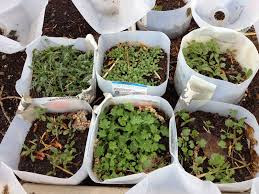Winter brings in chilly winds and snowfall
which can cause severe damage to the plants. Thus, it becomes very important to
carry out proper gardening so as to keep the plants and trees healthy in the
garden. Here are some of the tips that you can refer to when gardening in
winter:
- Road salt inflicts destruction on soil and plants. In areas of heavy salt use, soil salinity increases and vital soil life can be affected, not to mention all those loving plant roots and evergreen foliage that simply cannot tolerate being exposed to salt regularly. Safeguard roadside plantings from salt spray with a shield of landscape fabric erected into a fence with wooden stakes. For planting areas neighboring to walks and drives, select salt-resistant plants or depend on salt-free ice melters, like magnesium chloride or calcium chloride, instead.
- Get rid of dead tree. Winter is an outstanding time to have a worrying or dangerous tree removed from your property. With no plants to cloud their work, many arborists are more than contented to cut down trees that have to go at this time of year.
- Build a compost bin. Several garden centers are contented to get rid of additional pallets and some may even assemble to deliver them to your door. After the pallets are home, use them to build one or more three-sided bins. Utilize additional large plastic zip-ties to tie them together, giving each bin a back and two sides. Position your new composting system in a typically sunny site, and you will be up to your elbows before you know it.
- Year-round veggie gardeners need to look after their season extenders, eliminating snow from mini hoop tunnels and cold frames after a storm. If heavy snow is permitted to build up, it blocks sunlight from reaching the crops, but it can also harm the structures. Use a powerful broom or plastic shovel to get rid of snow.
- A common cause of plant death during winter months is too much moisture in the root zone. When planting traditional trees, veggies, bulbs or shrubs, make sure that plants are raised above areas that may be susceptible to flooding. Make sure there is adequate drainage so plants will not be bogged down by the impending rain that winter transports.
- Plant new shelter belts and hedges where they are necessary. These can change how you can use parts of your garden drastically, eliminating or at least reducing cold winds. It is possible to make an edible hedge using guavas, feijoas, and bay trees which offer food and function.
Winter is an outstanding time to
plan new gardens in your property in preparation for spring planting. It is a
superior idea to monitor future garden areas for cold winds and extreme
moisture, as both conditions will persuade what you can plant in that area.

No comments:
Post a Comment